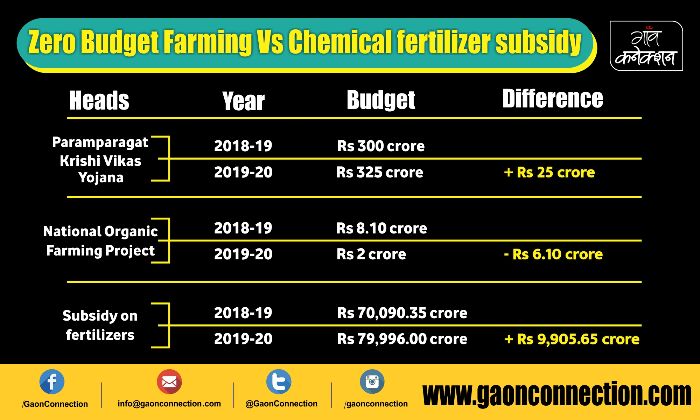“The climate is changing and the need of the hour is to promote organic farming. But it is practically impossible to do zero budget farming. The agricultural machinery is too expensive and where are the laborers? In such a scenario, zero budget farming is just a fancy, designer word,” said an agro-scientist working with a government agricultural institute.
Finance Minister Nirmala Sitharaman stressed on Zero Budget Farming while presenting the Budget for this financial year. She said this will help in doubling farmers’ income by 2022. However, agricultural experts think otherwise.
Just a few days after the budget, a report published in The Economic Times mentioned that the government has asked the Indian Council of Agricultural Research (ICAR), India’s top farm research institution, to conduct a study on the efficacy of zero budget farming before its nationwide rollout.
Agricultural policy expert Ramesh Chand, who is also a part of NITI Aayog, said the report is expected in two to three months. “There is no scientific evidence that proves that zero budget farming is effective. We will first assess the report, which the ICAR will be submitting, before reaching any conclusion,” Chand told the business daily.

What is Zero Budget Farming?
Zero budget farming is a method of farming where the cost of growing and harvesting plants is zero. Zero budget farming promises to cut down farming expenditure drastically and end the dependence on loans. It also whittles down cost of market materials, chemical fertilizers for one.
It also encourages use of indigenous seeds and locally available natural fertilizers like cow dung, cow urine, neem khali, datura (a plant used as an effective fertilizer, pesticide and insecticide). The government has been encouraging farmers to adopt this traditional method all over India.
Before the Budget, the government was planning to implement Padma Shri Subhash Palekar’s methodology all over India. He is an agriculturist who practiced and wrote many books on zero budget natural farming. He has been practicing this kind of farming since many years and was awarded the Padma Shri in 2016. NITI Aayog vice-chairman too has endorsed zero budget natural farming to improve conditions of farming.
The Paramparagat Krishi Vikas Yojana (PKVY), an initiative to promote organic farming in the country was launched by the NDA government in 2015. But in the Union Budget, an insignificant hike was announced on subsidy of fertilizers — Rs 300 crore (after amendment) were allocated in 2018-19, while Rs 325 crore were allocated in 2019-20. Budget of National Organic Farming Project which was Rs 8.10 crore last year was cut down to Rs 2 crore this year. However, a significant increase was announced in subsidy of chemical fertilizers. A sum of Rs 9,905.65 crore was allocated in surplus compared to the previous year.

Experts are divided
“From where did the government derive this word? Can the government explain what zero budget farming is? And if increase in organic farming is to be considered then what is the point of surplus subsidy on chemical fertilizers?” asked Sardar VM Singh, former MLA and convener of Rashtriya Kisan Mazdoor Sanghtan.
Fertilizer subsidy, which was Rs 70,090 crore in 2018-19, was hiked to only Rs 79,996 crore in 2019-20. This despite that fact that farmers had initiated a nation-wide protest march just ahead of the General Elections. They were protesting against unavailability of markets for organic farming, no help from the government and their continuous demand for curbing price for biological authentication.
In our country, over 70 per cent of the rural households depend on agriculture. Where Indian economy is widely dependent on agriculture, only Rs 25 crore in the Interim Budget and Rs 2 crore for Organic project was allocated for traditional farming. However, Rs 1,000 crore budget surplus has been allocated for chemical-based farming.
According to Subhash Palekar, recognized as the Father of Zero Budget Farming practiced Zero Budget Natural Farming, land of 30 acres can be cultivated if a farmer has one desi cow.
“This method has increased income of the farmers. For this reason, six states have already adopted this method as an agricultural policy. Vice-chairman of NITI Aayog, Rajiv Kumar, holds a keen interest in it. He also asked data for farmers practicing this type of farming from all states. It is because of these farmers, it has reflected in the budget,” said Gopal Upadhyay, Coordinator, Natural Agricultural Campaign.
“It is not possible to practice farming at zero cost. If farmers prohibit use of chemical fertilizers and weedicide then he will have to hire more labourers because weeds will not dispose off on their own. I do not buy many products from the market. But my farming is not zero budget farming even though it is chemical-free,” said Nitin Kajla, a farmer living in Bhattipura in Meerut district of Uttar Pradesh, who left his MNC job in order to practice organic farming.
He added, “Many features of zero budget farming are substantially good. Jivamrit, Dashparani extracts are quite successful. The government should augment Paramparagat Krishi Vikas Yojana. Plus, branding of farmers’ produce should be considered and markets for organic produce should also be provided. When rest of the farmers will observe changes then they will also adopt this type of farming otherwise it is all useless.”
Unavailability of market for organic farming is a root cause
Nandu Pandey, farmer from Sitapur in Uttar Pradesh also believes that practicing organic farming is not a problem, but the unavailability of markets is. He said, “If farmers will practice farming in a small landholding then he will sell all his produce in nearby markets. But farmers like us will grow bottle gourd (Lauki) or Capsicum (Shimla-mirch) in one or two acres. In that case we will produce two quintals of it regularly. What will happen then? So, it is very much necessary to create a market for organic farming.”
Gopal Upadhyay considers efforts of the government as a U-turn for promoting zero budget farming. He said, “It is for the first time that the government is talking about this type of farming. Otherwise the government as well as the scientists always talked about increasing utility using DAP-Urea and insecticides.”
Method of Subhash Palekar discards methods of agro-scientists. “Zero budget farming is also a type of organic farming. But farmers will not adopt farming unless it is practical. He will only adopt such type pf farming when he sees the positive impacts and only after testing it in his own farms or in nearby farms,” said Dr HN Singh, head of the department at Pant Nagar University (Agriculture Economics).
Read Also: Farmers need a helping hand from the govt for their cattle
“Earlier, number of members in the families were more, landholding was less, fallow and grazing land was more, animals were domesticated for milk and farming, these methods were suitable for that period of time. But in bid to feed a massive population there’s need of surplus varieties, fertilizers and insecticides,” commented Singh on practicality of zero budget farming.
Bharat Bhushan Tyagi, a farmer-cum-trainer awarded with Padma Shri in 2019 for promoting organic farming said, “It is necessary for farmers to get out of the markets’ trap. But no individual method will help farmers out. Researches have a key role to play in farming. Many times, scientists do not break out because of the pressure exerted from senior officials. Moreover, implementing zero budget farming has been in discussion since a long time in our country. The government should conduct survey to ensure veracity of zero budget farming on ground and then should implement it.”
Besides Ministry of Agriculture, onus of increasing income of the farmers’ is also on NITI Aayog. But questions have been raised against agriculture related issues in the Budget. “It was announced in Budget speech that it focuses on farmers and villages, but then why didn’t it talk about drought? They talk about Sabka Sath, Sabka Vikas, but I believe it is an act of betrayal. They talk about doubling farmers’ income but they increase 3-5% price on crops. When farmers start earning fair price then they start importing grains. It is very much necessary to modify these policies,” said Vijay Javanghiya, an agro-informer based in Pune, Maharashtra.




















